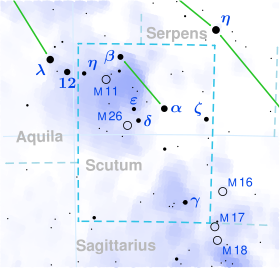| Observation data Epoch J2000 Equinox J2000 | |
|---|---|
| Constellation | Scutum |
| Right ascension | 18h 47m 10.474s[1] |
| Declination | −04° 44′ 52.342″[1] |
| Apparent magnitude (V) | 4.22[2] |
| Characteristics | |
| Evolutionary stage | Giant star |
| Spectral type | G4IIa[3] |
| U−B color index | +0.84[4] |
| B−V color index | +1.09[4] |
| Astrometry | |
| Radial velocity (Rv) | −28.75±4.88[1] km/s |
| Proper motion (μ) | RA: −7.972 mas/yr[1] Dec.: −16.398 mas/yr[1] |
| Parallax (π) | 4.8549 ± 0.3403 mas[1] |
| Distance | 670 ± 50 ly (210 ± 10 pc)[1] |
| Absolute magnitude (MV) | −2.99[5] |
| Orbit[6] | |
| Primary | Beta Scuti A |
| Companion | Beta Scuti B |
| Period (P) | 834 days |
| Semi-major axis (a) | 2.8 mas |
| Eccentricity (e) | 0.350 |
| Inclination (i) | 105.9° |
| Longitude of the node (Ω) | 288.1° |
| Periastron epoch (T) | 2422480.9 |
| Argument of periastron (ω) (secondary) | 33.9° |
| Details | |
| Radius | 49.26+3.24 −3.72[7] R☉ |
| Luminosity | 1,315±186[7] L☉ |
| Surface gravity (log g) | 0.94[8] cgs |
| Temperature | 4,951±25[7] K |
| Metallicity [Fe/H] | -0.16[5] dex |
| Rotational velocity (v sin i) | 7.8[9] km/s |
| Other designations | |
| Database references | |
| SIMBAD | data |
Beta Scuti, Latinized from β Scuti, is a binary star system in the southern constellation Scutum. Based upon an annual parallax shift of 4.85 mas as seen from Earth,[1] it is located approximately 670 light years from the Sun.
- ^ a b c d e f g Vallenari, A.; et al. (Gaia collaboration) (2023). "Gaia Data Release 3. Summary of the content and survey properties". Astronomy and Astrophysics. 674: A1. arXiv:2208.00211. Bibcode:2023A&A...674A...1G. doi:10.1051/0004-6361/202243940. S2CID 244398875. Gaia DR3 record for this source at VizieR.
- ^ Cite error: The named reference
aaa352_495was invoked but never defined (see the help page). - ^ Keenan, Philip C.; McNeil, Raymond C. (1989). "The Perkins catalog of revised MK types for the cooler stars". The Astrophysical Journal Supplement Series. 71: 245. Bibcode:1989ApJS...71..245K. doi:10.1086/191373.
- ^ a b Ducati, J. R. (2002). "VizieR Online Data Catalog: Catalogue of Stellar Photometry in Johnson's 11-color system". CDS/ADC Collection of Electronic Catalogues. 2237. Bibcode:2002yCat.2237....0D.
- ^ a b Anderson, E.; Francis, Ch. (2012). "XHIP: An extended hipparcos compilation". Astronomy Letters. 38 (5): 331. arXiv:1108.4971. Bibcode:2012AstL...38..331A. doi:10.1134/S1063773712050015. S2CID 119257644. Vizier catalog entry
- ^ Ren, Shulin (2013). "Hipparcos Photocentric Orbits of 72 Single-lined Spectroscopic Binaries". The Astronomical Journal. 145 (3): 81. Bibcode:2013AJ....145...81R. doi:10.1088/0004-6256/145/3/81. S2CID 120199240.
- ^ a b c Baines, Ellyn K.; Clark, James H., III; Schmitt, Henrique R.; Stone, Jordan M.; von Braun, Kaspar (2023-12-01). "33 New Stellar Angular Diameters from the NPOI, and Nearly 180 NPOI Diameters as an Ensemble". The Astronomical Journal. 166 (6): 268. Bibcode:2023AJ....166..268B. doi:10.3847/1538-3881/ad08be. ISSN 0004-6256.
{{cite journal}}: CS1 maint: multiple names: authors list (link) - ^ Soubiran, Caroline; Le Campion, Jean-François; Brouillet, Nathalie; Chemin, Laurent (2016). "The PASTEL catalogue: 2016 version". Astronomy & Astrophysics. 591: A118. arXiv:1605.07384. Bibcode:2016A&A...591A.118S. doi:10.1051/0004-6361/201628497. S2CID 119258214.
- ^ De Medeiros, J. R.; Mayor, M. (1999). "A catalog of rotational and radial velocities for evolved stars". Astronomy and Astrophysics Supplement Series. 139 (3): 433. arXiv:astro-ph/0608248. Bibcode:1999A&AS..139..433D. doi:10.1051/aas:1999401. Vizier catalog entry
